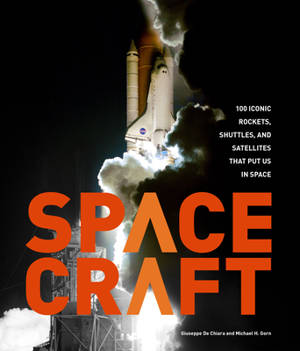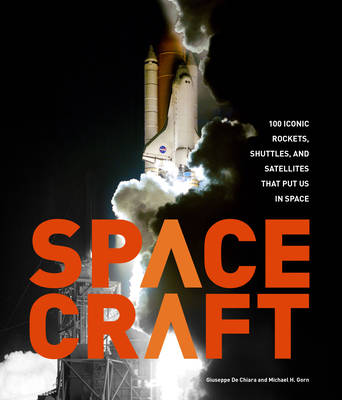
Door een staking bij bpost kan je online bestelling op dit moment iets langer onderweg zijn dan voorzien. Dringend iets nodig? Onze winkels ontvangen jou met open armen!
- Afhalen na 1 uur in een winkel met voorraad
- Gratis thuislevering in België vanaf € 30
- Ruim aanbod met 7 miljoen producten
Door een staking bij bpost kan je online bestelling op dit moment iets langer onderweg zijn dan voorzien. Dringend iets nodig? Onze winkels ontvangen jou met open armen!
- Afhalen na 1 uur in een winkel met voorraad
- Gratis thuislevering in België vanaf € 30
- Ruim aanbod met 7 miljoen producten
Zoeken
Spacecraft
100 Iconic Rockets, Shuttles, and Satellites That Put Us in Space
Michael H Gorn
Hardcover | Engels
€ 36,45
+ 72 punten
Omschrijving
Spacecraft takes a long look at humankind's attempts and advances in leaving Earth through incredible illustrations and authoritatively written profiles on Sputnik, the International Space Station, and beyond. In 1957, the world looked on with both uncertainty and amazement as the Soviet Union launched Sputnik 1, the first man-made orbiter. Sputnik 1 would spend three months circling Earth every 98 minutes and covering 71 million miles in the process. The world's space programs have traveled far (literally and figuratively) since then, and the spacecraft they have developed and deployed represent almost unthinkable advances for such a relatively short period. This ambitiously illustrated aerospace history profiles and depicts spacecraft fromSputnik 1 through the International Space Station, andeverything in between, including concepts that have yet to actually venture outside the Earth's atmosphere. Illustrator and aerospace professional Giuseppe De Chiara teams up with aerospace historian Michael Gorn to present a huge, profusely illustrated, and authoritatively written collection of profiles depicting and describing the design, development, and deployment of these manned and unmanned spacecraft. Satellites, capsules, spaceplanes, rockets, and space stations are illustrated in multiple-view, sometimes cross-section, and in many cases shown in archival period photography to provide further historical context. Dividing the book by era, De Chiara and Gorn feature spacecraft not only from the United States and Soviet Union/Russia, but also from the European Space Agency and China. The marvels examined in this volume include the rockets Energia, Falcon 9, and VEGA; the Hubble Space Telescope; the Cassini space probe; and the Mars rovers, Opportunity and Curiosity. Authoritatively written and profusely illustrated with more than 500 stunning artworks, Spacecraft: 100 Iconic Rockets, Shuttles, and Satellites That Put Us in Space is sure to become a definitive guide to the history of manned space exploration.
Specificaties
Betrokkenen
- Auteur(s):
- Illustrator(s):
- Uitgeverij:
Inhoud
- Aantal bladzijden:
- 224
- Taal:
- Engels
Eigenschappen
- Productcode (EAN):
- 9780760354186
- Verschijningsdatum:
- 4/09/2018
- Uitvoering:
- Hardcover
- Formaat:
- Genaaid
- Afmetingen:
- 248 mm x 286 mm
- Gewicht:
- 1301 g

Alleen bij Standaard Boekhandel
+ 72 punten op je klantenkaart van Standaard Boekhandel
Beoordelingen
We publiceren alleen reviews die voldoen aan de voorwaarden voor reviews. Bekijk onze voorwaarden voor reviews.











